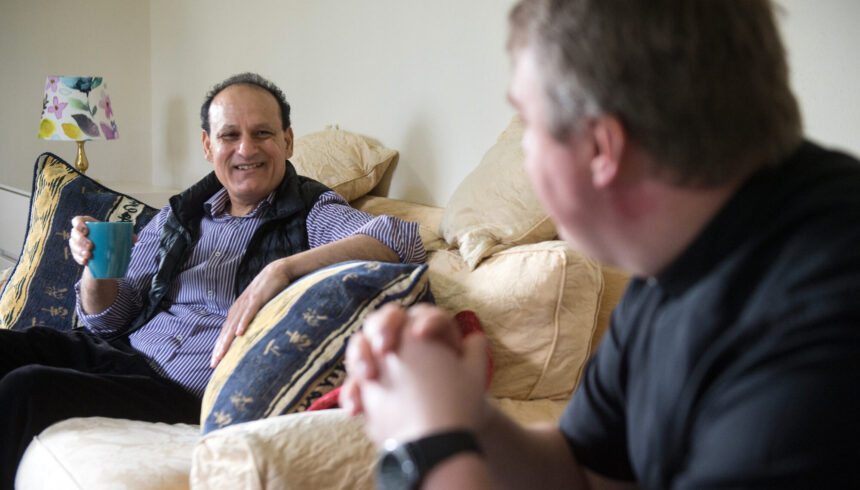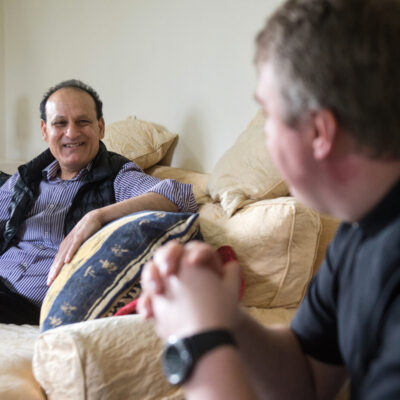As we mark the UN World Day of Social Justice, JRS’ Accomodation Officer, Amy-Leigh, speaks to a refugee friend and reflects on housing injustice and the pervasive impact that a denial of such a basic human right has on refugee friends.
Excluded from areas of daily life, unable to access basic services, banned from working and unwelcome in the education system – the impact of a life in limbo is devastating. For many refugee friends, housing insecurity and street homelessness is the most pressing consequence of the UK’s hostile environment: it can be felt for decades.
When a society is just, it protects human rights with no discrimination. We know that there are around 8 million people in the UK suffering the injustice of poor, or insecure housing. There is an ongoing, intensifying housing crisis. It is both a reflection and a cause of deepening inequality across society.
When we look at hierarchies of needs, or think of our basic rights, we know how foundational shelter is in enabling human flourishing. Because without safe and stable housing, it is impossible to attend to other aspects of ones’ life. For the thousands of refugee friends being pushed into destitution each year, this reality makes them increasingly vulnerable.
Learn more about the experience of homelessness amongst refugee friends
A partial solution, the JRS At Home refugee hosting scheme
Through the hospitality and kindness of volunteer hosts, the At Home hosting scheme is challenging housing injustice, offering refugee friends necessary security, respite and hope. Local families and religious communities welcome friends into their home, providing them with a temporary stay.
I spoke to a refugee friend, Maryum, who is currently being hosted through the At Home scheme, about the impact stable housing has had on her life:
“I start thinking about myself, about my food, about my clothes, about my study, everything before, about my life, you know, about my [asylum] case. Before, the only thing was how to survive and how to keep myself safe, where I’m going to sleep… now [I’m in the hosting scheme] I’m doing yoga. I’m doing my classes…I start thinking about myself again because before the only thing [on my mind] was like accommodation.”
The refugee friends who access our accommodation project are protected from unsafe sleeping arrangements and removed from environments that risk abuse and exploitation. More than this, they have privacy, security, a place to belong, and a place to restore their identity.
“When I close my door, I know that no one can come inside. And when I came to the house, I know that no one can touch me.”
A humanising experience
After learning that her long-term accommodation was being put on hold for a while, Maryum was frightened to be returning to precarious conditions. But through At Home, Maryum has been met with an open heart by hosts and volunteers. The feeling that others care is a humanising experience, uncommon within the dire asylum system.
“I[t] was really scary. I was thinking that, oh my God, I’m going to go through the same things again. But thanks to JRS believe me: they helped me…This is kind of opportunity to meet new people. Very kind people. Like before, I was thinking everybody is the same like, you’ll do the same kind of response.
But when we see the response in a different way, he’s changed my mind, you know that I know that there are many good people.”
Having safe and stable shelter is integral in allowing refugee friends to begin rebuilding their lives. With such limited choices, the security of a home provides invaluable respite to refugee friends forced into destitution. No longer preoccupied with their immediate safety, and able to rest properly again, refugee friends have more headspace to move forwards with their case and consider their options for the future. This is empowering, offering renewed agency, and allowing refugee friends to live in dignity.
Some refugee friends become volunteers
Maryum now volunteers at a night shelter for women over the weekends, too. Understanding how exhausting and dangerous it is for homeless women to spend each day in search of safety, this work is helping to restore her sense of pride, by offering security, and dignity, to other women.
Hosting schemes are not the solution to a hostile environment, or housing injustice on a wider scale. But they offer fundamental support to those in need, and I am grateful for the hope, connection, and safety that they provide to refugee friends.
Now more than ever, we are called to fight housing injustice and ensure that everyone has access to a home. A place they can begin to build a life again.
Help JRS to challenge housing injustice today: consider becoming a host.
Image description: a refugee guest chats warmly with their host, as they sit together in the hosts living room.



